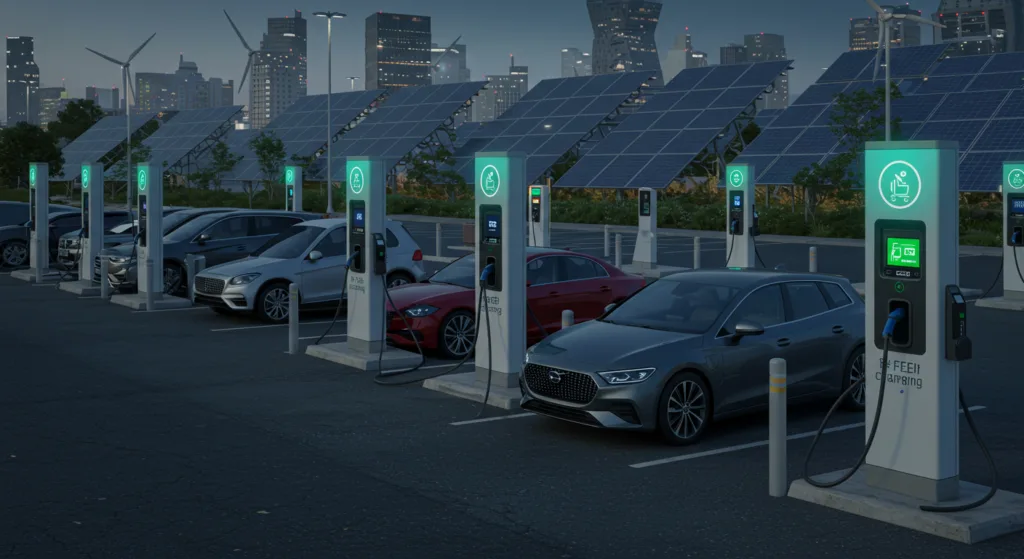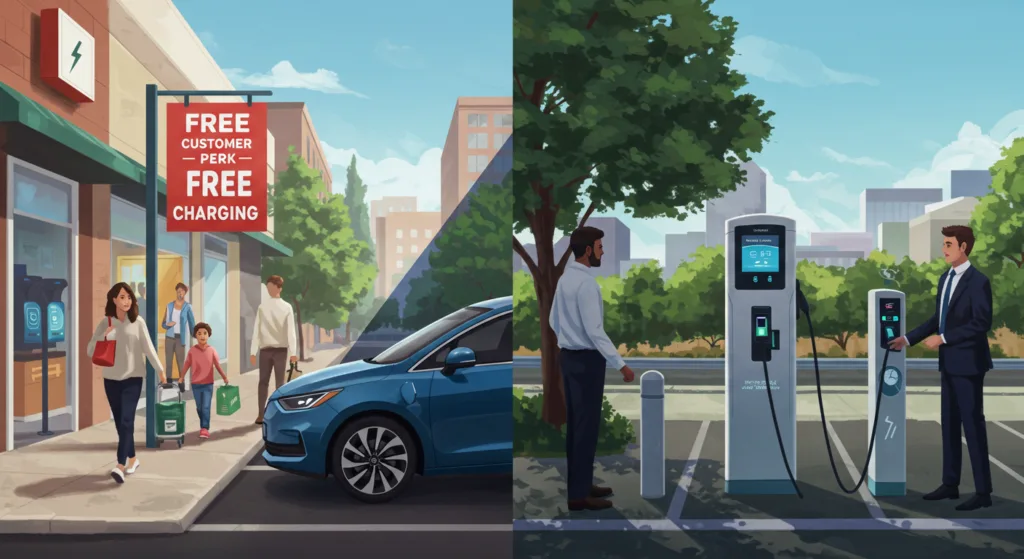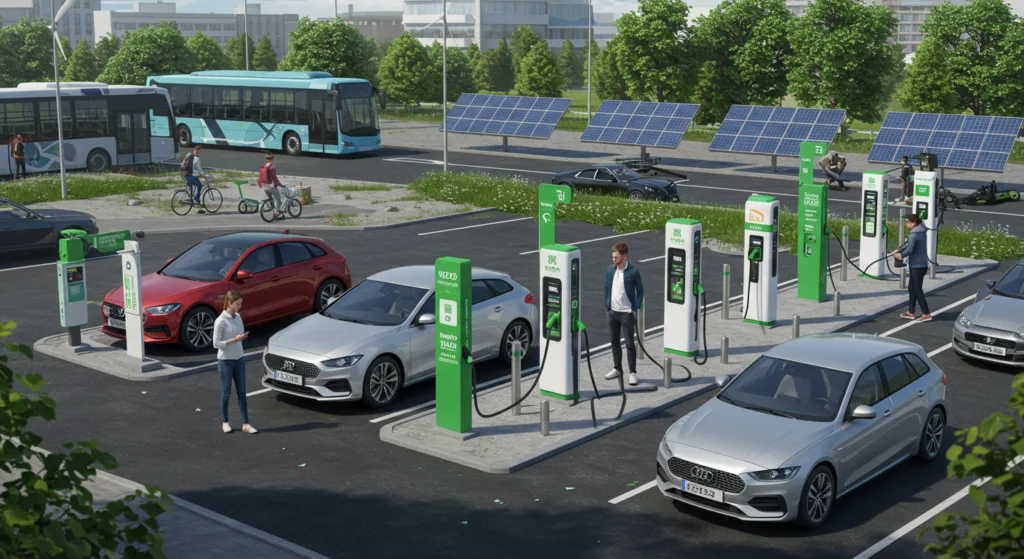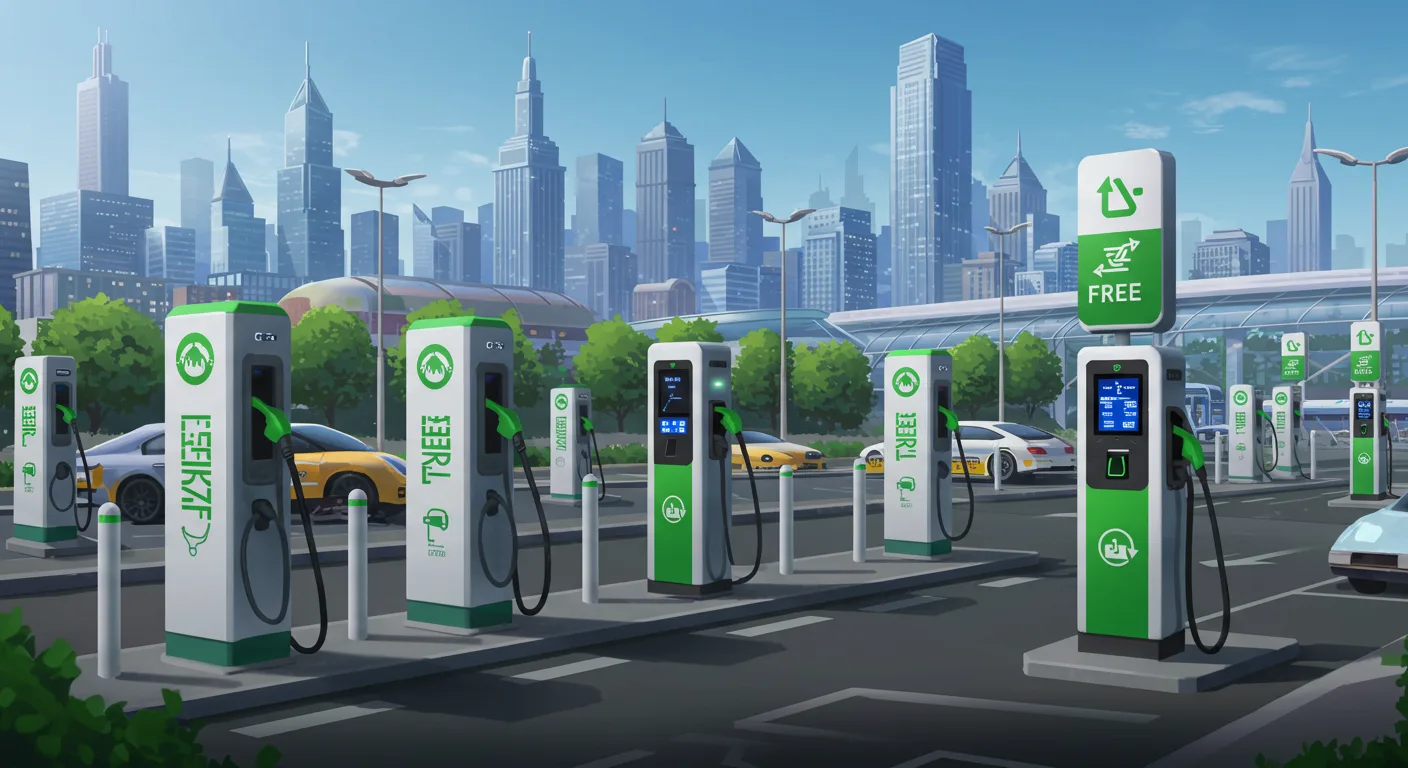Are EV Charging Stations Free in 2025? Exploring Costs and Accessibility

As the demand for electric cars (EVs) grows, one of the most common questions among EV owners and potential buyers is: Are EV charging stations free in 2025? With charging networks expanding and new pricing models emerging, it’s essential to understand the costs and accessibility of EV charging today. Let’s explore whether public charging stations still offer free charging, how much it costs to charge an EV, and whether Tesla Superchargers remain free for all Electric Cars owners in 2025.
Do Public Charging Stations Still Offer Free Charging in 2025?
Free EV charging stations were once a significant incentive to encourage electric vehicle adoption. In 2025, some free charging options still exist, but they are becoming less common as more providers shift to a paid model to support infrastructure maintenance and expansion.
Where Can You Still Find Free Public Charging?
While many public chargers now require payment, some locations continue to offer free charging, including:
- Retailers and Shopping Centers: Stores like Walmart, Target, and Whole Foods have partnered with charging networks to provide free Level 2 charging for customers. However, availability depends on the location.
- Hotels and Resorts: Many hotels offer complimentary EV charging as an added perk for guests.
- Workplaces: Some companies provide free EV charging as part of employee benefits.
- Government-Funded Stations: Some cities and municipalities still operate free public charging stations as part of sustainability initiatives.
Why Are Free Charging Stations Declining?
- Increased Demand: As EV adoption grows, free stations often experience long wait times, leading operators to introduce pricing to manage usage.
- High Infrastructure Costs: Installing and maintaining charging stations is expensive, prompting businesses to start charging fees.
- Monetization by Charging Networks: Companies like Electrify America, ChargePoint, and EVgo are prioritizing subscription and pay-per-use models.
If you rely on free charging, using apps like PlugShare, ChargeHub, or Tesla’s in-car navigation can help you locate free stations near you. However, most new stations being installed in 2025 require payment to ensure long-term sustainability.
How Much Does It Cost to Charge an Electric Car at a Charging Station?
The cost of charging an Electric Car at a public station in 2025 depends on several factors, including the charging speed, location, network provider, and electricity rates. Here’s a breakdown of average costs:
Charging Costs by Charging Type
- Level 1 (120V – Home Outlets)
- Slowest charging option (3-5 miles per hour of charge).
- Usually free but inefficient for public use.
- Level 2 (240V – Public and Home Chargers)
- Adds 25-30 miles per hour of charging.
- Cost: $0.10 – $0.40 per kWh, translating to $5 – $15 for a full charge (depending on battery size).
- DC Fast Charging (Superchargers, Electrify America, EVgo, etc.)
- Adds 100+ miles in 30 minutes.
- Cost: $0.30 – $0.60 per kWh, meaning a full charge can cost between $15 and $40 depending on the battery capacity.
Pricing Models at Public Charging Stations
Public charging networks use different pricing models:
- Pay-per-kWh: You pay based on the electricity consumed (common in most U.S. states).
- Time-Based Pricing: Charges are based on minutes of charging (common in states where per-kWh billing is restricted).
- Subscription Plans: Networks like Electrify America and EVgo offer membership plans that lower per-kWh costs.
Example of Charging Costs for Popular Electric Cars (2025 Estimates)
| EV Model | Battery Size (kWh) | Level 2 Full Charge Cost | DC Fast Charging Cost |
|---|---|---|---|
| Tesla Model 3 (RWD) | 57.5 kWh | $6 – $14 | $18 – $34 |
| Ford Mustang Mach-E | 91 kWh | $9 – $20 | $27 – $50 |
| Hyundai Ioniq 5 | 77.4 kWh | $8 – $18 | $23 – $42 |
Key Takeaway: Home charging remains the cheapest option, but for those who rely on public stations, charging costs can vary significantly based on speed and location. Using charging memberships or off-peak hours can help reduce expenses.
Are Tesla Superchargers Free for All Electric Cars Owners in 2025?
Tesla Superchargers have long been a key advantage for Tesla owners, but in 2025, their pricing model continues to evolve.
Are Tesla Superchargers Free for Any Owners in 2025?
- Legacy Free Supercharging: Tesla owners who purchased certain models before 2017 still enjoy free unlimited Supercharging. However, this does not apply to newer Tesla buyers.
- New Tesla Buyers (2025 Models): New Tesla owners must pay for Supercharging at rates between $0.28 – $0.45 per kWh, varying by location.
- Tesla Referral Program Perks: Tesla occasionally offers free Supercharging miles as referral bonuses or promotional incentives.
Can Non-Tesla Electric Cars Use Tesla Superchargers?
Yes! Tesla has expanded its Supercharger network to include non-Tesla Electric Cars in many locations.
- Non-Tesla Pricing: Non-Tesla users pay higher rates than Tesla owners unless they subscribe to Tesla’s charging membership.
- Adapters Required: Some non-Tesla vehicles require a CCS adapter to use Superchargers.
Tesla Supercharging Costs in 2025 (Estimated Per kWh Pricing by Region)
| Region | Tesla Owner Price | Non-Tesla Price |
|---|---|---|
| California | $0.36/kWh | $0.50/kWh |
| Texas | $0.28/kWh | $0.42/kWh |
| New York | $0.32/kWh | $0.48/kWh |
Tesla still dominates in fast charging reliability, but free unlimited Supercharging is largely a thing of the past. Most Tesla owners must pay, and non-Tesla EV drivers can now access the network at premium rates.
💡 EV Charging Tip:
🔋 Charge during off-peak hours to save on costs! Many utility providers offer lower electricity rates at night or during non-peak hours, making home and public charging more affordable
Free vs. Paid Electric Cars Charging: Where Can You Charge Your Car for Free?

As the electric vehicle (EV) market grows, so does the demand for convenient and affordable charging solutions. While paid charging stations are now the norm, some places still offer free charging as a customer perk or public service. If you’re looking to cut costs and find free EV charging in 2025, this guide will help you identify retailers, businesses, government programs, and the best apps to locate free stations.
Which Retailers and Businesses Offer Free EV Charging in 2025?
Many businesses provide complimentary EV charging to attract eco-conscious customers, encourage longer visits, and promote sustainability. However, availability varies by location, and some free stations may have time limits.
Top Retailers Offering Free EV Charging in 2025
- Walmart & Sam’s Club – Select locations offer free Level 2 chargers via partnerships with Electrify America and EVgo.
- Target – Many Target stores have free ChargePoint stations, but some may require a store purchase.
- Whole Foods – Provides free EV charging at select locations, typically through Blink or Volta.
- IKEA – Offers free EV charging in major metropolitan stores, often on Level 2 stations.
- Kroger & Safeway – Some grocery store chains have free chargers for shoppers.
Hotels and Restaurants with Free EV Charging
- Marriott & Hilton Hotels – Many locations offer complimentary charging for guests.
- McDonald’s & Starbucks – Some outlets provide free charging, often in collaboration with Volta.
- Tesla Destination Chargers – Found at hotels, resorts, and wineries, Tesla’s Level 2 chargers are often free for guests.
Workplaces and Office Complexes
- Corporate Campuses – Companies like Google, Apple, and Microsoft provide free charging for employees.
- Co-Working Spaces – Some WeWork and Regus locations offer free EV charging as an added perk.
Key Tip: Many of these free chargers are limited to customers and may have a time cap (e.g., two-hour limit while shopping). Checking with store management or apps like PlugShare can confirm real-time availability.
Are There Any Government-Funded Free Charging Stations?
Many governments, both federal and local, support free EV charging as part of clean energy initiatives. While entirely free government-funded charging stations are becoming less common, some cities, states, and municipal programs still offer no-cost options.
U.S. Cities and States Offering Free Public Electric Cars Charging
- California – Several cities, including Los Angeles and San Francisco, offer free or discounted public Level 2 chargers through local sustainability programs.
- New York City – NYC’s Department of Transportation operates free municipal charging stations in select boroughs.
- Austin, Texas – The Austin Energy Plug-In EVerywhere program includes some free charging options.
- Chicago, Illinois – Free Level 2 charging is available at certain city-owned garages and public parking lots.
- Portland, Oregon – The Portland General Electric (PGE) free charging initiative includes stations in downtown areas.
Free EV Charging in Europe (2025 Programs)
- Germany – Many park-and-ride lots near metro stations still offer free Level 2 chargers.
- Norway – A leading EV-friendly country, Norway has free chargers at government buildings and transit hubs.
- France – Select municipal parking garages in Paris and Lyon still provide free EV charging.
Government-Funded Free Charging Initiatives
- State Incentives & Rebates – Some U.S. states offer reimbursements or credits for public charging, effectively making it free.
- Utility Company Programs – Electric utilities sometimes sponsor free off-peak charging for residential and commercial areas.
- National Park & Public Lands – Free EV chargers are available at some national parks, rest stops, and visitor centers.
Pro Tip: Many city-funded chargers have time limits (e.g., two hours max) to prevent misuse. Always check posted rules before plugging in.
How to Find Free Charging Stations Using Apps and Maps?
Finding free EV charging in 2025 is easier than ever, thanks to apps and real-time charging maps that highlight no-cost options.
Best Apps to Locate Free EV Charging Stations
- PlugShare – Filters free chargers, showing user reviews and real-time availability.
- ChargeHub – Lists retail locations and municipal chargers offering free charging.
- Electrify America – Though mostly paid, this app highlights certain free promotional chargers.
- Tesla Navigation – Tesla drivers can find free Destination Chargers at hotels and businesses.
- Google Maps – Now includes EV charging filters, allowing users to find free stations.
How to Use These Apps Effectively
- Enable Location Services – This helps find nearby free charging stations instantly.
- Use Filter Options – Select “Free Charging” or “No Cost” filters in PlugShare and ChargeHub.
- Check User Reviews – Some locations may have broken chargers or unexpected fees, so always verify before heading there.
- Plan Ahead – Free charging spots fill up quickly, so checking availability in real-time prevents wasted trips.
Hidden Free Charging Locations Most Drivers Miss
- Public Libraries & Community Centers – Some cities provide free charging at libraries.
- Hospitals & Medical Centers – Certain hospitals offer free EV charging for patients and visitors.
- Universities & College Campuses – Many institutions provide complimentary EV charging for students and faculty.
- Airports – Some long-term parking lots have free Level 2 chargers (though spots may be limited).
Final Tip: Free charging locations can change over time. Regularly updating your charging app ensures you don’t miss out on new free options.
📢 EV Charging Quote:
“The future of transportation is electric, and accessible charging is the key to making it a reality for everyone.”
Future of Electric Cars Charging: Will More Free Charging Stations Be Available?

With electric vehicle (EV) adoption accelerating globally, the availability and affordability of charging stations are critical concerns for drivers. In 2025, the trend is shifting towards more structured and paid charging networks, but there are still opportunities for free charging in certain situations. This article explores whether cities and municipalities are expanding free public charging, if workplaces and residential areas will offer more complimentary charging options, and how EV owners can minimize costs using membership plans and incentives.
Are Cities and Municipalities Expanding Free Public Charging?
The Shift from Free to Paid Public Charging
Over the last decade, cities worldwide have introduced free EV charging stations to promote sustainable transportation. However, many of these programs are now transitioning to paid models due to:
- Increased Demand: More Electric Cars on the road mean free stations experience overcrowding.
- Maintenance Costs: Free charging programs require government funding, which is often redirected to other projects.
- Commercialization of Charging Networks: More cities partner with private companies (Electrify America, ChargePoint, EVgo), which prefer pay-per-use or subscription-based models.
Which Cities Still Offer Free Public EV Charging?
While free public charging is declining, some cities still maintain no-cost options in select locations:
- Oslo, Norway: The government continues to offer free EV charging in certain public parking areas.
- Los Angeles, USA: Some municipal buildings and park-and-ride locations still provide limited free Level 2 charging.
- Amsterdam, Netherlands: EV owners with no home charger can apply for subsidized access to free city chargers.
- Berlin, Germany: A pilot project is testing free charging at select urban locations, but it may transition to paid access soon.
Future Trends in City-Provided Charging
- Time-Limited Free Charging: Some cities offer the first 30 minutes free before charging per kWh.
- Free Charging for Public Transport Users: Certain municipalities provide EV drivers with free charging if they use public transport.
- Solar-Powered Public Chargers: Cities like San Diego and Melbourne are installing solar-powered EV chargers that provide low-cost or free energy.
If you’re looking for free charging in your city, check municipal websites or use PlugShare to find government-backed charging stations.
Will Workplace and Residential Charging Become Free?
Workplace EV Charging: A Growing Employee Perk
More companies recognize the importance of providing Electric Cars charging as an employee benefit, but will it remain free? In 2025:
- Tech Companies: Google, Apple, and Microsoft continue offering free workplace charging.
- Corporate Campuses: Businesses with sustainability goals still provide complimentary Level 2 charging for employees.
- Manufacturing & Logistics: Some companies in the automotive and logistics industries provide discounted or free charging for EV drivers.
However, many workplaces are now shifting to pay-per-use models due to:
- Rising Electricity Costs – Employers must cover increasing energy demands.
- Fair Usage Policies – Some employees charge excessively, leading to usage caps or time-limited free charging.
Will Apartment Complexes and Homes Offer Free Charging?
For EV owners without home chargers, apartment buildings and housing communities are a key area of focus. Here’s how residential charging is evolving:
- New Apartment Buildings – Many require EV chargers by law but may charge tenants for usage.
- HOA & Community Charging – Some homeowners’ associations (HOAs) install shared EV chargers, often with free access for residents.
- Solar-Powered Home Charging – Many homeowners install solar panels + battery storage, making home EV charging effectively free after installation costs.
Free Charging for Renters & Homeowners: Is It Possible?
If you rent an apartment or live in a community without a personal EV charger, here are ways to access free charging:
- Request Workplace Charging: Some employers subsidize charging costs for employees who don’t have home chargers.
- Petition Your Landlord: Some property owners install chargers after tenant requests, especially in regions with EV adoption incentives.
- Join a Charging Network: Some utility companies provide free nighttime EV charging for customers on special plans.
How to Reduce EV Charging Costs with Membership Plans and Incentives?
While free public charging is becoming less common, EV drivers can still significantly cut costs through loyalty programs, subscription plans, and government incentives.
Top EV Charging Membership Plans (2025)
| Charging Network | Membership Cost | Discounted Charging Rate | Other Benefits |
|---|---|---|---|
| Electrify America | $4/month | $0.31/kWh (vs. $0.43/kWh for non-members) | Faster charger access |
| EVgo Plus | $7/month | $0.27/kWh | Discounted pricing + reservation options |
| Tesla Supercharger Membership | $12/month | $0.29/kWh (vs. $0.39/kWh for non-members) | Lower per-kWh rates for non-Tesla Electric Cars |
| ChargePoint Flex Pass | Free | Variable discounts (location-dependent) | Earn credits for future charging |
Pro Tip: Many charging networks offer free trials or referral credits, so always check for promotions before committing to a membership.
Government Incentives & Utility Programs
- Off-Peak Charging Discounts: Many utilities offer lower rates at night (e.g., $0.05/kWh between 11 PM – 6 AM).
- EV Purchase Rebates: Some governments provide rebates covering home charger installation costs.
- Solar & Battery Integration: Homeowners using solar panels can effectively charge for free by storing energy for EV use.
- Public Charging Incentives: Some cities still provide free charging credits for new EV buyers.
Loyalty and Retail Programs for Free Charging
- Starbucks & Volta Partnership: Offers free 30-minute EV charging at select Starbucks locations.
- Grocery Store Discounts: Some supermarkets give free EV charging credits for loyalty card members.
- EV Ride-Share Discounts: Uber and Lyft provide charging credits for EV drivers on their platforms.
Final Tip: Always check your local utility provider’s EV programs—many offer free or discounted home charging solutions that can save hundreds of dollars per year on energy costs.
EV charging in 2025 is evolving, with fewer free charging stations but smarter ways to save on costs. While cities, workplaces, and retailers still offer some free options, the shift to paid models makes it essential to use charging apps, membership plans, and incentives to reduce expenses. Whether you’re a daily commuter or a long-distance traveler, staying informed about free and affordable charging options can make your EV experience more cost-effective.
⏳ Important Reminder:
🚗⚡ Not all “free” EV chargers stay free forever! Retailers, cities, and companies often introduce free charging as a perk, but these can shift to paid models over time. Always check your EV charging apps and plan ahead to avoid unexpected costs.
🚗⚡ Found this article helpful? Share it with your friends on social media and help more EV drivers save money! 🔋🔄



